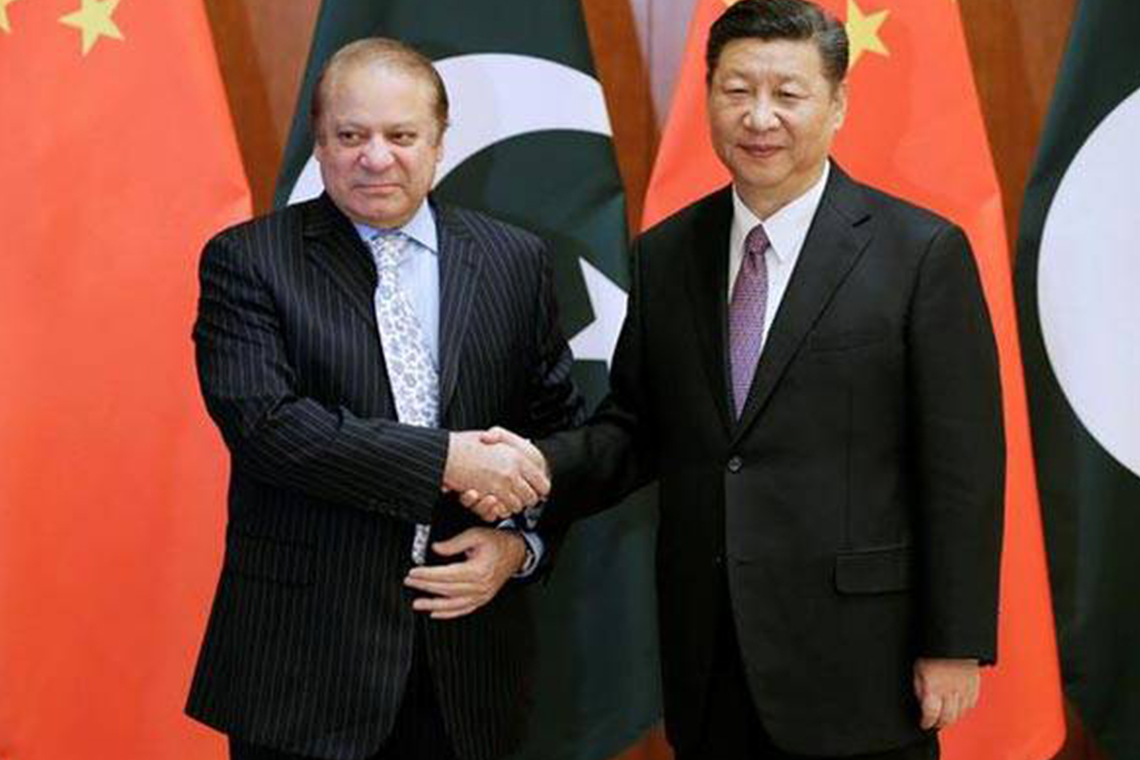China’s plan for Pakistan, and drone registration
A roundup of the top China news for May 16, 2017. Get this free daily digest delivered to your inbox by signing up at supchina.com/subscribe.

China’s plan for Pakistan
Pakistani newspaper Dawn has “publicly disclosed for the first time” details from documents that set out the long-term plan for the China-Pakistan Economic Corridor (CPEC), whose major element is a transportation link between far western Xinjiang Province in China and the port of Gwadar in south-western Pakistan.
CPEC is a long-planned project that has become one of the key elements of the Belt and Road initiative. Much of the analysis of CPEC has seen it as primarily a means for China to gain access to an Indian Ocean port and grow a new market, but the plan also includes an agreement for China to lease “thousands of acres of agricultural land…to set up ‘demonstration projects’ in areas ranging from seed varieties to irrigation technology.” Dawn says that “access to the full supply chain of the agrarian economy is a top priority for the Chinese,” followed by development of the textile spinning sector, growth of a Pakistani market for Chinese cement and household appliances, and greater financial integration that will “advance the internationalization of the RMB,” China’s currency.
The documents also indicate a Chinese plan to install “a full system of monitoring and surveillance…in cities from Peshawar to Karachi, with 24-hour video recordings on roads and busy marketplaces for law and order.”
India did not send a delegate to the Belt and Road Forum in Beijing over the weekend, and remains concerned that the CPEC route goes through disputed areas of Kashmir.
China requires real-name registration for civilian drones
Drones are one tech sector where China remains lightly regulated, and this is one reason sometimes cited for China’s growing dominance of the emerging drone industry. But the regulators are coming for the drones: Xinhua News Agency reports that China’s civil aviation regulator will require “drones weighing more than 250 grams to be registered under real names starting from June 1 to improve civil aviation safety.” The government is also “working on systems to share and check civilian drone registration data.”
‘Tough’ new intelligence / spying law
Reuters says that China has “quietly released the first public draft of an intelligence law giving authorities powers to monitor suspects, raid premises, and seize vehicles and devices while investigating domestic and foreign individuals and groups.” A full translation of the draft law is available at China Copyright and Media.
—Jeremy Goldkorn, Editor-in-Chief
This issue of the The China Project newsletter was produced by Sky Canaves, Lucas Niewenhuis, Jia Guo, and Jiayun Feng. More China stories worth your time are curated below, with the most important ones at the top of each section.
BUSINESS AND TECHNOLOGY:
The rise of facial recognition technology in China
Face++, a Beijing-based facial recognition technology startup, is now valued at roughly a billion dollars. Technology from Face++ is being used in several apps such as Alipay, a mobile app used by more than 120 million people in China, and Didi, China’s dominant ride-hailing company. Baidu, which operates China’s most popular search engine, is developing a system that lets people pick up train tickets by showing their face.
The technology is expanding quickly in China for surveillance and convenience purposes. As the Chinese government has a large centralized database of ID card photos, officials are using software to identify suspected criminals with video surveillance cameras. Also, to tackle the problem of toilet paper theft from public bathrooms, Beijing is using facial recognition at some tourist sites to limit the amount of toilet paper that each person can take. One of China’s top universities installed scanners with facial recognition technology in a female dormitory. In a different university, a lecturer is using the technology on his students to check on the boredom levels in class.
- Alibaba’s $60bn payments arm stalls planned IPO / Financial Times (paywall)
“The blockbuster listing of Ant Financial, the payments affiliate of Alibaba, has been put on ice until the end of next year at the earliest, according to bankers.” - Former U.S. trade representative argues for renegotiation with China / WSJ (paywall)
“Charlene Barshefsky accuses President Xi Jinping of accelerating reversals in liberalizing changes.” Hear more from Ambassador Barshefsky on last week’s Sinica Podcast. - Mobile payments charge up McDonald’s, Starbucks in China / Caixin (paywall)
- China looks overseas for designers to build brands / Bloomberg
- Coffee, classical music and wrestling celebrate Chinese infrastructure / WSJ (paywall)
- Malaysia’s AirAsia to launch China budget carrier unit / Nikkei Asian Review
- China increases U.S. Treasury holdings by most in two years / Bloomberg
- Yum China to buy majority stake in delivery services firm Daojia / Reuters
- The global market for wine: China leads the emergence of a new world order / The Conversation
POLITICS AND CURRENT AFFAIRS:
China’s mass DNA database on citizens set to expand with $8.7 million in new equipment
Human Rights Watch released a report on May 15 claiming that China’s database of citizen DNA information has expanded beyond 40 million entries. While still accounting for only 3 percent of Chinese citizens — for comparison, the U.S. has DNA records on 4 percent of its citizens and the U.K. has 8 percent — the database is now the world’s largest of its kind. Furthermore, the report also brings together evidence on a number of data collection events conducted “without oversight, transparency, or privacy protections” under the authority of Article 130 of the Criminal Procedure Law — but many, if not most, entries are not of criminals or directly related to a criminal case.
One piece of evidence from the report, that authorities in restive Xinjiang Province in western China purchased $8.7 million in DNA testing equipment for a large-scale collection, has been confirmed to the Associated Press by state security officials. Human Rights Watch also reported the purchase of an additional $2.9 million in equipment. A computational biologist told the AP that such equipment “could be used to profile up to 10,000 DNA samples a day and several million a year.” Last year, the authorities in Xinjiang began requiring residents — a plurality of which identify as Uyghur Muslims — to submit DNA samples and other personal data to apply for a passport.
- China adds its voice to chorus of condemnation as UN Security Council vows sanctions of North Korea’s latest missile test / SCMP
“In a unanimous statement backed by the North’s main ally China, the council on Monday vowed to punish Pyongyang’s ‘highly destabilizing behavior’ and demanded a halt to any further nuclear or missile tests.” - Pushing back against China’s One Belt, One Road, India, Japan build strategic ‘Great Wall’ / Economic Times
“India and Japan are holding a separate session on May 24 with stakeholders from Africa on the sidelines of the Africa Development Bank meeting in Ahmedabad to discuss joint projects on capacity building and infrastructure.” - Xi tells Japanese lawmaker he wants to put ties on right course / The Mainichi
Toshihiro Nikai, secretary general of Japan’s ruling Liberal Democratic Party, met with Chinese president Xi Jinping for a quick 17-minute meeting in Beijing. Nikai brought a letter from Prime Minister Shinzo Abe that “called for the start of mutual visits at an appropriate time, according to a Japanese official.” - China got 30 countries to take a stand on climate change and protectionism — mostly tiny ones / Quartz
- China releases British CEO of alleged million-dollar pyramid scheme / Reuters
- Translation: Next Weekly interview with Guo Wengui / China Digital Times
SOCIETY AND CULTURE:
Olympic badminton player Lin Dan demands unpaid salary
Lin Dan is a professional badminton player from China. He is a two-time Olympic champion and five-time World Champion and became the first men’s singles player to retain the Olympic gold medal by winning in 2008. Recently, he attracted attention from the media not because of his achievements or his extramarital affair with actress Zhao Yaqi last year, but because he’s asking for salary worth 4,000,000 yuan ($588,200) owed to him, plus salary owed to six other players by the club they have played for since 2016.
In a Weibo post (in Chinese), Lin said he had participated in all the games required by the club but neither he nor his six fellow players have received any payments from the club. Many internet users supported Lin’s act of demanding his unpaid salary. One commenter said (in Chinese), “Absolutely safeguard the legitimate rights and interests of athletes! Don’t say that Lin Dan doesn’t need this amount of money. He is not only protecting his own rights but also protecting other athletes’ rights.”
- Slaughter of Africa’s donkeys for China hurts poorest farmers / Bloomberg
- Chinese appetite for totoaba fish bladder kills off rare porpoise / The Guardian
- Why Chinese are spending $24 billion to buy the right to live overseas / SCMP
- First-ever overseas campus by a Chinese university taps into Belt and Road opportunities / Caixin
- Europe’s top football clubs realizing that China is no longer a country to be exploited or a gullible cash-cow / SCMP
- Actor’s death sparks self-imposed industry blacklist against drunk driving violators / The Beijinger





